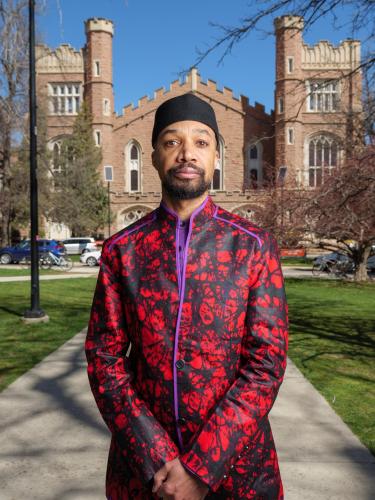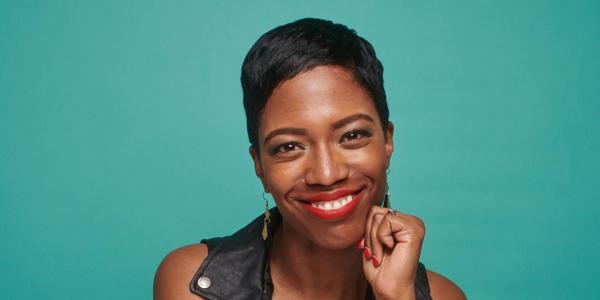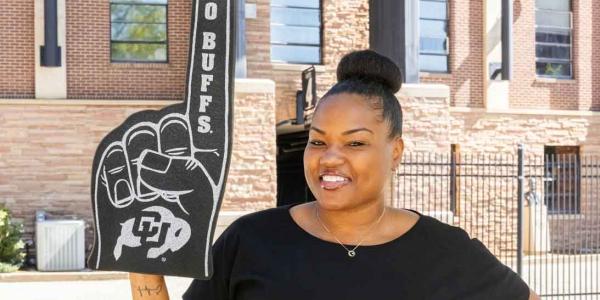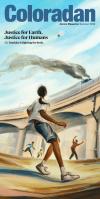
Reiland Rabaka, professor of African, African American and Caribbean Studies in the Department of Ethnic Studies, is the founder and director of CU Boulder’s Center for African & African American Studies (CAAAS, pronounced “cause”). Rabaka has published 18 books, including his recent work, Du Bois: A Critical Introduction and Black Power Music! Protest Songs, Message Music and the Black Power Movement. Here he discusses the CAAAS, his students and the importance of a movement.
Who have had the largest impacts on your career?
I was raised by my grandmother and my mother. I would not be who I am physically, intellectually, spiritually or culturally without them. My mother, an ordained Baptist minister, instilled the value of education in me.
Secondly, if you want me to geek out for you — W.E.B. Du Bois. Du Bois gave me a model for the kind of intellectual, artistic and activist life I could live. Du Bois was the first African American to graduate with a PhD from Harvard University in 1895. He inaugurated sociology in the United States. Alongside his social scientific work, he wrote five novels, nine volumes of poetry, three dozen short stories and two dozen plays. He was a social scientist, an artist and an activist.
And musically?
Billie Holiday. I love Lady Day. She sings some of the most beautiful, poignant, melancholic love songs you will ever hear. But at the same time, she sang “Strange Fruit,” an anti-lynching song released in 1939. Black people can say things in song that we can't say in any other way. It seems like we can express ourselves more fully in our art, especially our music. That is one of the reasons a lot of my teaching and research revolves around Black popular music.
What brought you to CU Boulder?
I’m an ambassador for African American studies. There are suburban and rural youth at CU Boulder who never had the opportunity to take African American studies classes. This is the first chance for many of them. From the very beginning of my time at CU I felt a special kinship with my students. We are part of the first generation of American citizens to come of age in a desegregated and awkwardly integrated American society.
"One of the high points of my intellectual and activist life was to teach the Black Lives Matter Movement seminar, and for my students to immediately apply what they’re learning in class to CU."
Also, CU has a long tradition of really high-profile African American studies scholars. For instance, my faculty line was once occupied by Manning Marable, who received a Pulitzer Prize for his biography of Malcolm X. Then Joy James, who is an endowed chair and incredible, brilliant, phenomenal Black feminist philosopher. This position has been seen as a high-profile post where people can do serious work and make important contributions. And, you know, Boulder is kind of freaky and geeky. And I have a bit of a Bohemian mindset. I feel at home here.
What was it like building the CAAAS directly with students?
One of the high points of my intellectual and activist life was to teach the Black Lives Matter Movement seminar, and for my students to immediately apply what they’re learning in class to CU. Students used direct action and political pressure techniques. Their petition for the CAAAS got 1,500 signatures — and there’s only 800 Black students at CU Boulder. So, obviously, we have a lot of allies. It also inspired us to know that the CAAAS would be a space primarily for Black folk, but also for our anti-racist allies, because they, too, want to know about African and African American history and culture.
What about CAAAS makes you most excited?
We have three program areas — a research program, an arts program and a student services program. That’s what makes the CAAAS unique: It’s like a one-stop shop for everything that has to do with Blackness, Black folk and Black culture on campus.
It is a warm and welcoming communal space. I’m trying to create an African village vibe on the Boulder campus. I wanna bring some Africanité — some of the history, culture and art of continental and diasporan Africa — to Macky Auditorium, CU Boulder and beyond.

What is a course you look forward to teaching every time?
There has been something truly special about teaching the Black Lives Matter Movement class. Teaching the class, I realized many of my white students don’t have a space to evolve their anti-racism and explore what it means to be an authentic ally. In fact, they do not have opportunities and spaces to have serious and sensitive conversations about what that means — what it means to be an authentic anti-racist ally. The CAAAS is also a safe space for allies.
What do you do outside of work?
I’m a poet. I remember the first time I read Langston Hughes, his poetry was so alive and beautiful. I love Audre Lorde, one of my favorite poets of all time. I’m a musicologist, so I spend a lot of time listening to music. I read novels. I love literature — I read about three to four books a week. Lastly, I’m a long-distance hiker. I live about 15 minutes from Rocky Mountain National Park, and I’m out there probably four or five times a week.
Is there anything else you would like us to know?
The CAAAS wouldn’t have happened without incredible student co-founders Ruth Woldemichael (EthnSt, IntlAf’22), Karia White (EthnSt, IntlAf’22), Audrea Fryar (PolSci’21) and Isaiah Chavous (PolSci’21). There’s a Kenyan proverb that says: if you see me standing tall, it’s because I stand on the shoulders of my ancestors and my family members. So, even though we are not biologically related, we’re family. I’m trying to build a big multiracial and multicultural family here in Boulder. That's what the CAAAS is about. If it’s about nothing else, it’s about creating a sense of belonging and building community.
Photos by Glenn Asakawa






